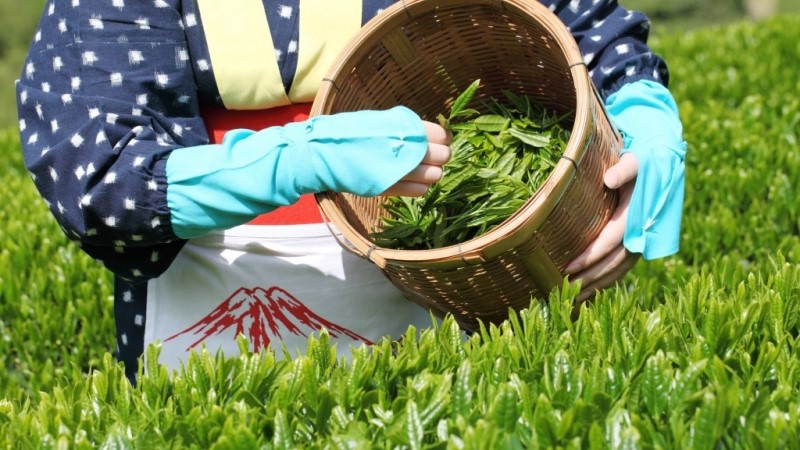We give you 5 good reasons to choose organic tea. Many people buy organic tea for health reasons, but there are many reasons to opt for organic over conventional farming.
Reason #1 Organic Tea is better for you
One of the main reasons people opt for organic tea over conventionally grown tea is that organic tea is better for the drinker.
It is true that some pesticides and fertilizers are removed during tea processing and many of these chemicals are water soluble, which means they are not in the leaf structure and are removed from tea leaves during steeping.
Conversely, in 2012, a major Greenpeace study found that pesticide levels in Chinese teas are often too high. Similarly, another study found that regularly drinking pesticide-contaminated tea does more harm than good and may actually decrease (rather than increase) lifespan.
However, this is a myopic view of why a person would consider choosing organic tea over conventionally grown tea.
Reason #2 Organic Tea is Better for Farmers
We’ve established that drinking organic tea is ideal for your health. Now, imagine that part of your job is to spray fields of tea with chemicals or to apply them by hand, let’s also emphasize common masks and gloves are not of such good quality…
Time and again, there are tea growers and field workers in India, Taiwan and elsewhere who spray their crops without the use of masks, gloves or other protective clothing.
Despite all evidence to the contrary, these chemicals are considered safe and even necessary by many farmers.
That’s unfortunate, because farmers are the first to be harmed by their decision to use chemicals to treat the land where they work and live.
Today, some of the most active proponents of organic tea growing are those who have been directly affected by the devastating effects of chemical tea growing methods.
These include tea growers whose parents and siblings have died of cancer or pesticide poisoning, as well as those who have personally been sickened by the chemicals they used on their land before converting to organic tea production.
Reason #3 Organic Tea Supports Small Farmers and Farms
There are some large organic tea companies in the world. However, most organic farms are located in smaller plots of land run by small businesses. This relates to the nature of organic farming.
Conventional agriculture involves all kinds of chemicals used to keep nature from “interfering” with crops.
But well-managed organic farms do the opposite. They work in harmony with nature to manage various pests and other “problems.” This generally means that the farms do not grow tea as a monoculture.
Organic tea fields can have natural grasses and weeds as a ground cover, and let nature create balance on its own instead of trying to eradicate one type of ‘problem’ only to find that it causes another to the soil.
In addition, smaller operations in China, Taiwan and many other tea-producing regions are family-owned. And workers are often treated more ethically.
Most of the money tends to go directly to the farmers themselves, creating abundance in countries where farmers tend to be poorer people.
Reason #4 Organic Tea is better for tea plants
Would you rather drink tea made from a plant that was grown in a toxic and stressful situation or a tea that was grown in harmony with nature?
Many tea tasters and connoisseurs can perceive the differences between conventionally grown and organic teas.
It is suspected that many of the negative side effects that some people feel from drinking too much tea (such as nervousness, insomnia and the like) may not be a direct result of the caffeine in the tea, but of unnatural chemicals used in the production of conventional tea.
Some people claim that conventional tea is “superior” to organic tea because it provides more nitrogen to the tea plants.
However, at best, this is a weak statement. It’s like saying someone on steroids is “superior” to someone who trains in the gym.
It is also worth noting that there are no chemical pesticides, herbicides, fungicides or fertilizers made specifically for tea. The chemicals that are applied to tea plants are generic and were not made to address the unique needs of the tea plant and its ideal surroundings.
Reason #5 Organic tea does not cause serious damage to the environment
Conventionally grown tea is one of the most environmentally devastating crops in Asia.
Because it is often grown at high altitudes, chemicals applied to conventional tea plantations not only damage the local ecosystem, but run down mountains and hills to devastate other farms, forests, rivers and even oceans located miles and miles away.
Many of the pesticides used in conventional tea cultivation contain excess heavy metals, which not only show up in some finished teas, but also wash downstream to contaminate soil and water elsewhere.
And meanwhile, the fertilizers being washed down the mountains cause over-fertilization of other crops and plants, killing many species over time.
In addition, pesticide use unbalances the ecosystem by killing not only pests, but also their natural predators (such as spiders and ladybugs).
Pesticides often kill about 99 percent of the insects on the farm, leaving a small population of harmful species whose populations multiply rapidly.
Meanwhile, populations of beneficial organisms take longer to reestablish themselves within the ecosystem (because their life cycles are slower and they produce fewer offspring in a given period of time).
This situation often requires the use of additional chemicals or more frequent application of chemicals to eliminate the oversized pest population.
In the long run, fertilizer use also hardens the soil, making it increasingly difficult for tea plants to grow without more chemicals.
This type of chemical dependency becomes a vicious cycle in which tea plants, farmers, the local environment, the environment in general, and tea drinkers are all losers.
Discover all our selection of Organic Teas.



